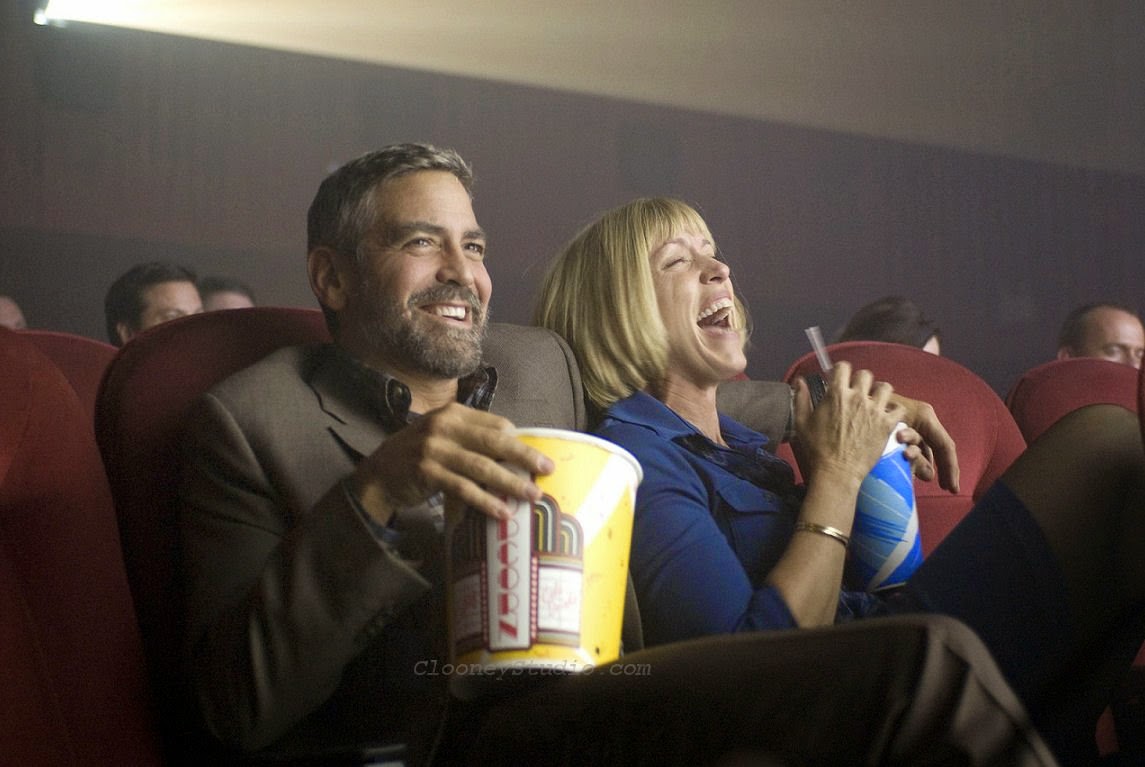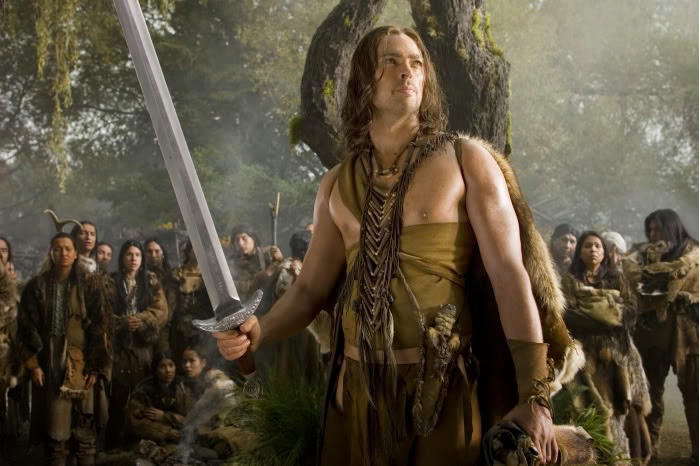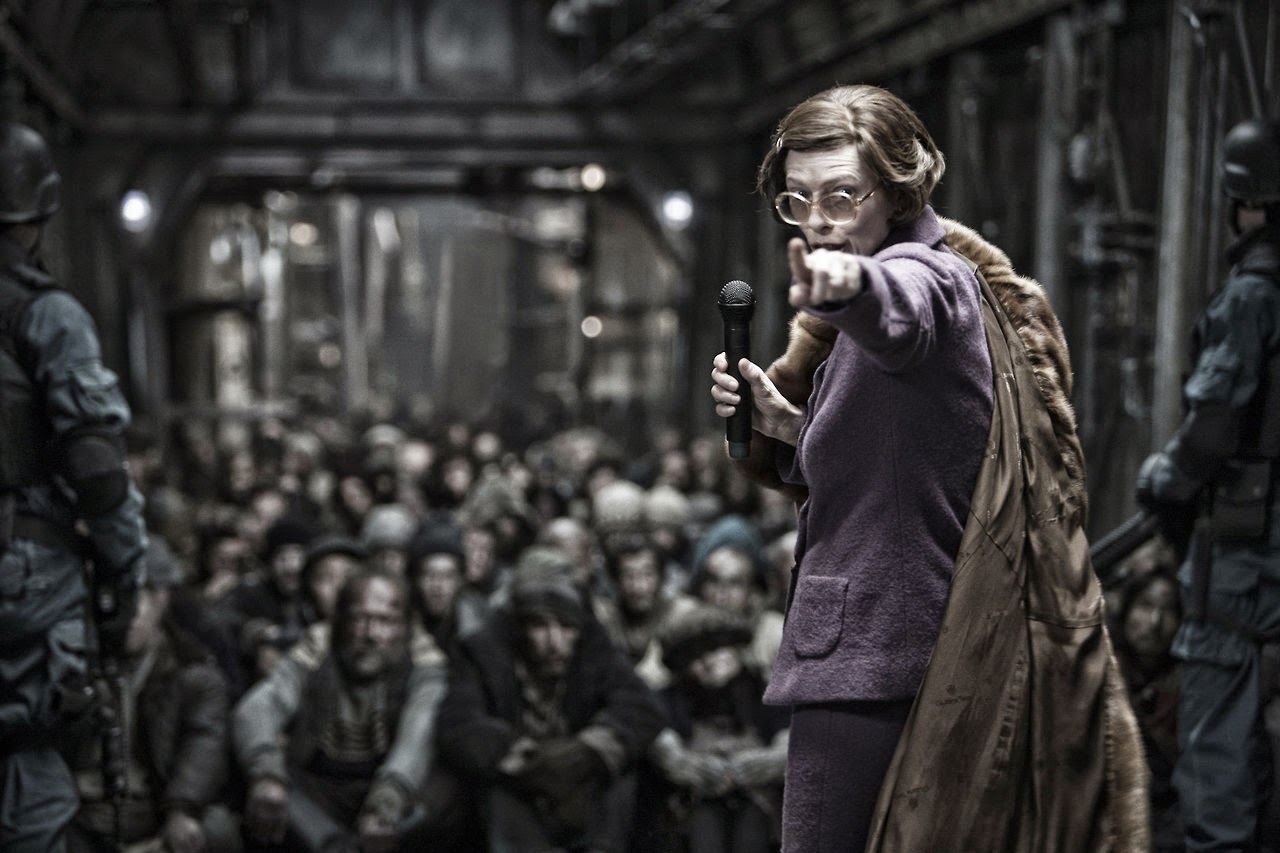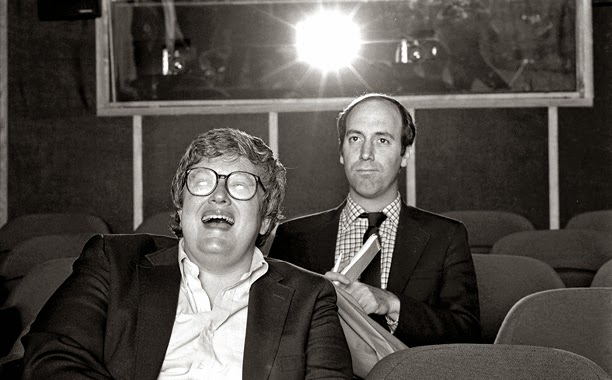A critical window of insight is what separates the characters in Neil Marshall’s “The Descent” from the disposable line of victims normally seen in modern horror movies. It occurs in the opening scenes, when three female friends are out rafting enthusiastically through treacherous river waters. They share laughs, shouts of warning, and occasional lighthearted screams. Their antics are spied by a man and his daughter from a nearby hillside, both of whom are there to cheer on Sarah (Shauna Macdonald). She is the wife and mother, a woman with few cares in the world beyond this current moment. When the raft pulls into an embankment and the three friends begin to part, awkward glances are exchanged between the man and Juno (Natalie Mendoza), Sarah’s other friend. The third catches sight of these gazes, but does not convey a response beyond internal fascination. And then in the next scene, Sarah and her family are on the road heading back into town when tragedy strikes: he veers accidentally off into the lane of incoming traffic, and a head-on collision with another car ends with the deaths of husband and daughter. Later, long after their world has collapsed under the weight of horrific new adventures, one of them makes an observation that effectively frames the entire premise of their interactions: “we all lost something in that crash.”
Thursday, July 31, 2014
Monday, July 28, 2014
12 Years a Slave / **** (2013)
Steve McQueen’s stark, powerful “12 Years a Slave” leaps far beyond the notion of basic film composition and penetrates to the core of the human condition, at a time when the acts of a people left a stain on our civilization from which there could be no return. To see it – and indeed, to experience it – is to be part of one of the most haunting encounters we will ever have with a movie screen. Based on a prevailing memoir of one man’s perseverance during the years of American slavery, the film is the embodiment of historical resonance, and McQueen doesn’t so much direct a picture as he allows his mind to be a vessel for unflinching candor while a camera bears witness. Here is an endeavor so brutal, so honest and stirring, that it inspires a collective pause akin to what “Schindler’s List” did for the subject of the Holocaust.
Saturday, July 26, 2014
Jersey Boys / *** (2014)
There’s narration in “Jersey Boys” that calls to mind the approach of “DeLovely” and “Beyond the Sea,” in which musical stars of the 50s and 60s possess hindsight in what will transpire in their eventful lives. Why exactly do those years call to mind a desire for writers to turn their characters into all-knowing observers in their own histories? Does relating the events through a modern perspective add something significant to the approach? A context, perhaps? For the four young men at the center of Eastwood’s newest movie, it is characteristic of a trend that suggests those times are now too distant for today’s audiences to relate. Here emerges a chronicle of young ambitious musicians who are just starting to find their place and write their legacy, but they speak directly to the camera as if stand-ins to “The Jersey Shore”; they are blatantly vulgar and contemporary, and driven by short-sighted indulgences. And yet their deliberate foresight also serves as some kind of elaborate warnings sign, a prolonged metaphor that seems to underscore the naivety of all aspiring stars in the age of artistic unrest. How unfortunate that the old adage “if only we knew then what we know now” doesn’t allow them to affect such details, even as they watch on fully knowing what fate has in store for them.
Thursday, July 24, 2014
Alien 3 / *** (1992)
“In an insane world, a sane man must appear insane.”
The opening images reverberate with distinct tension. A leathery egg appears in the corner of a chamber, recently opened. The window of a cryotube cracks as something unseen scurries nearby. A generic computer voice overhead warns of an internal fire. Then there is a shot of a facial x-ray, with an alien specimen latched on. Acid blood spills on the floor, eating away at it. For those well versed in the stories of the “Alien” pictures, these moments foreshadow a familiar reality: the slimy creatures have left behind a terrible present on this escape pod, and the three survivors of James Cameron’s brilliantly effective “Aliens” are immediately thrust back into danger, all while their vessel passes silently among the stars. That they face this danger while still in hyper sleep is one of the many challenging moments of this, the third picture in the franchise, but their intentions remain in doubt for many seasoned observers: was this collection of shots an attempt by a then-inexperienced director at taking a story arc to the brink of its potential, or were they merely moments of blinding miscalculation meant to abandon the momentum set up in the previous entry?
The opening images reverberate with distinct tension. A leathery egg appears in the corner of a chamber, recently opened. The window of a cryotube cracks as something unseen scurries nearby. A generic computer voice overhead warns of an internal fire. Then there is a shot of a facial x-ray, with an alien specimen latched on. Acid blood spills on the floor, eating away at it. For those well versed in the stories of the “Alien” pictures, these moments foreshadow a familiar reality: the slimy creatures have left behind a terrible present on this escape pod, and the three survivors of James Cameron’s brilliantly effective “Aliens” are immediately thrust back into danger, all while their vessel passes silently among the stars. That they face this danger while still in hyper sleep is one of the many challenging moments of this, the third picture in the franchise, but their intentions remain in doubt for many seasoned observers: was this collection of shots an attempt by a then-inexperienced director at taking a story arc to the brink of its potential, or were they merely moments of blinding miscalculation meant to abandon the momentum set up in the previous entry?
Thursday, July 17, 2014
Hitler's Children (2011)
Five names, five lives forever cast in the shadows of evil. Their faces are hard-worn from existences that seem almost otherworldly, their expressions indicative of countless years of brooding and self-loathing. Who are they? What significance do they hold? Has their experience lead them to outright detachment? They are some of the last descendants of the Nazi empire, and coursing through their veins is the blood of a legacy that will forever haunt them, torture them, and subject them to certain social exile. That they have spent their entire lives atoning for the sins of their ancestors is critical in the study of their troubled lives, but why should they have to go through all of that now, so long after the dust has settled? Are the horrors of our parents and grandparents so potentially horrific that they could, quite possibly, reverberate into the histories of those who come long after?
Tuesday, July 15, 2014
Burn After Reading / ***1/2 (2008)
Deep dark secrets are the crux for the characters of “Burn After Reading.” Some possess them, others strive to uncover what they suspect are smoking guns in elaborate pursuits. Their common bond, for better or worse, is stupidity; never is there a moment between them (or in isolation) when the obvious conclusions are as clear as they should be, essentially because they are driven by agendas that deny all possible traces of logical thinking. But the journey for answers (and in some cases, general security) carries them along continuously through a plot absorbed in varying levels of suspense, uncertainty and the dubious promise of some great final revelation – of what exactly, who the heck knows, but judging by all those wide-eyed gazes, it sure does look to be suspicious!
Monday, July 14, 2014
Pathfinder / zero stars (2007)
“Pathfinder” is one of the ugliest and most incomprehensible movies I have ever seen, a cynical exercise so unpleasant to endure that it doesn’t even have the gumption to inspire disbelief, much less unintentional laughs. Had the camera been a firing squad pointed towards its actors, their careers would have taken less damage. And what’s far worse a notion is that its filmmakers, obviously caught somewhere between insanity and masochism, actually had the nerve to make and release a movie in this utterly wretched condition. Was no one in the pre-production stages willing to speak up in protest, if for no other purpose than to prevent undoubtedly talented individuals from embarrassing themselves? Or were their protests simply unheeded because of misplaced arrogance? A documentary dealing with that answer would make for far more interesting a movie than the result currently staggering around in front of us.
Sunday, July 13, 2014
Snowpiercer / ***1/2 (2014)
They refer to it as the sacred engine. On and on it churns, forever caught in the same dreary cycle of transporting its inhabitants towards no destination of consequence. Those that dwell within – as they have done for seventeen long years – are not so much living as they are existing, and the confined space of a train amplifies the urgency of their merciless class system. The front of the tireless locomotive is a bastion for the wealthy and privileged, while the back, filled with lowly poverty-stricken sorts, is little more than an over-crowded prison. A clear divide between factions is established early on – the same that inspires all obligatory uprisings in stories about imbalanced social structures – but what hope is there for anyone, in any class system, when the world beyond the train offers no hope of perseverance? “Snowpiercer,” a film about such a conflict, ponders those thoughts amidst the deafening prospect that such ordeals may, in fact, be an allegorical projection of the same ill-fated endpoint that we as humanity are habitually headed toward. On a track that leads nowhere, what price would anyone pay for just a few shining moments at the top of a shrinking food chain?
Monday, July 7, 2014
Life Itself (2014)
The unsung hero of Steve James’s “Life Itself” is a rare force even by the standards of effective fiction. It is not Roger Ebert, the brilliant movie critic of the Chicago Sun-Times, but rather his wife Chaz, a woman whose capacity for love left behind resounding echoes in the life of a man who might have faded into darkness without her. To see her present for the final stages of his life is to witness the endearing patience of an angel; while her emotional struggles remain mostly private, her commitment to his care is steadfast, and the camera is even present in a moment when they both have a striking but calm disagreement over whether he should be walking up stairs after being discharged from a hospital stay. “You need to trust us,” she advises, even when his clenched fists indicate stubborn protest. How did she manage to tread so calmly through the lengthy wilderness of a frail and dying mate without resorting to outright emotional exhaustion? The answer is not as important as the reality, which goes to the heart of meaning in Ebert’s third act of life: when illness leaves one crippled beyond repair, it takes someone strong-willed to provide unending support and compassion, just as it does to fight the disease with all one’s might.
Sunday, July 6, 2014
Frozen / ***1/2 (2013)
At the heart of every good fairy tale is a plethora of wondrous images and thoughtful subtexts. Disney’s “Frozen,” the latest of a long line of motion picture endeavors from the studio to first discover this reality, arrives at the epicenter of that tradition with enthralling results: funny, whimsical and delightful to a fault, it is one of those movies that engages minds of all ages, much in the same way that “Beauty and the Beast” and “Sleeping Beauty” did for their respective generations. And this notion comes, ironically enough, as a bit of a surprise – unexpected in the sense that its confidence is usually a lost virtue in the age of cynicism, and the movie’s values are a clear departure from the more recent standards of computer-generated animation, which usually involve bright colors and mindless adventure. Somehow, these filmmakers resist bowing to those conventions. Based on an enduring little story by Hans Christen Anderson, here is a movie that champions the cause of more wistful and enchanting standards and brings them back to a golden benchmark. And like the recent “Tangled,” it also rediscovers the liveliness of classic fables while supplying it with a modern brashness.
Subscribe to:
Posts (Atom)










